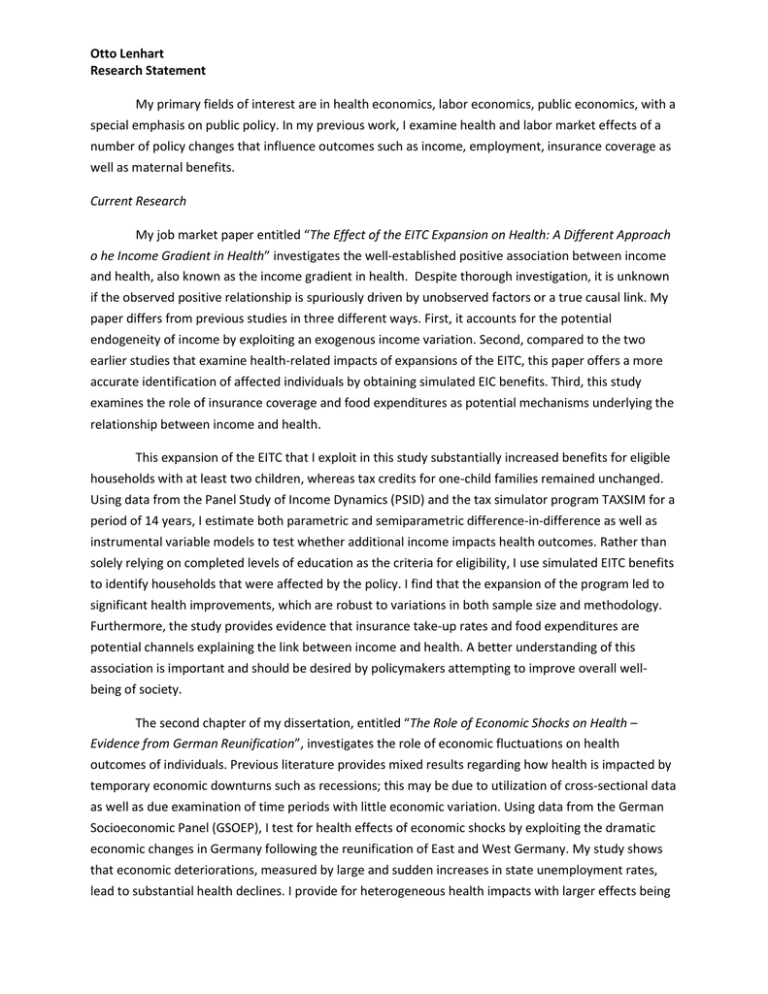Otto Lenhart Research Statement
advertisement

Otto Lenhart Research Statement My primary fields of interest are in health economics, labor economics, public economics, with a special emphasis on public policy. In my previous work, I examine health and labor market effects of a number of policy changes that influence outcomes such as income, employment, insurance coverage as well as maternal benefits. Current Research My job market paper entitled “The Effect of the EITC Expansion on Health: A Different Approach o he Income Gradient in Health” investigates the well-established positive association between income and health, also known as the income gradient in health. Despite thorough investigation, it is unknown if the observed positive relationship is spuriously driven by unobserved factors or a true causal link. My paper differs from previous studies in three different ways. First, it accounts for the potential endogeneity of income by exploiting an exogenous income variation. Second, compared to the two earlier studies that examine health-related impacts of expansions of the EITC, this paper offers a more accurate identification of affected individuals by obtaining simulated EIC benefits. Third, this study examines the role of insurance coverage and food expenditures as potential mechanisms underlying the relationship between income and health. This expansion of the EITC that I exploit in this study substantially increased benefits for eligible households with at least two children, whereas tax credits for one-child families remained unchanged. Using data from the Panel Study of Income Dynamics (PSID) and the tax simulator program TAXSIM for a period of 14 years, I estimate both parametric and semiparametric difference-in-difference as well as instrumental variable models to test whether additional income impacts health outcomes. Rather than solely relying on completed levels of education as the criteria for eligibility, I use simulated EITC benefits to identify households that were affected by the policy. I find that the expansion of the program led to significant health improvements, which are robust to variations in both sample size and methodology. Furthermore, the study provides evidence that insurance take-up rates and food expenditures are potential channels explaining the link between income and health. A better understanding of this association is important and should be desired by policymakers attempting to improve overall wellbeing of society. The second chapter of my dissertation, entitled “The Role of Economic Shocks on Health – Evidence from German Reunification”, investigates the role of economic fluctuations on health outcomes of individuals. Previous literature provides mixed results regarding how health is impacted by temporary economic downturns such as recessions; this may be due to utilization of cross-sectional data as well as due examination of time periods with little economic variation. Using data from the German Socioeconomic Panel (GSOEP), I test for health effects of economic shocks by exploiting the dramatic economic changes in Germany following the reunification of East and West Germany. My study shows that economic deteriorations, measured by large and sudden increases in state unemployment rates, lead to substantial health declines. I provide for heterogeneous health impacts with larger effects being Otto Lenhart Research Statement found for East Germans, lower-income workers as well as for those who were unemployed shortly after reunification. Furthermore, I find that changes in exercise frequency, psychological well-being as well as in economic uncertainty can explain the observed health impacts following economic variations. An improved understanding of the how health outcomes are affected by economic changes is important for governments attempting to curb the negative effects of economic downturns. The final chapter of my dissertation, entitled “Do Higher Minimum Wages Benefit Health? Evidence from the UK”, estimates whether increased wage floor impact health outcomes of low-wage workers. In order to provide evidence for a causal link, I use data from the British Household Panel Survey (BHPS) and exploit the introduction of the National Minimum Wage (NMW) in the UK on April 1st, 1999, as an exogenous variation of wages. To my knowledge, this is the first study that directly tests for potential health benefits of minimum wage regulations. By estimating Difference-in-Differences and instrumental variable models, I find that the policy change significantly improved a number of health measures such as self-reported health status and whether individuals suffer from a number of health conditions. Consistent with previous work, no changes in working hours are found as a result of the reform, whereas income of affected workers increases substantially. In a combined work with Vinish Shrestha at Emory University, we investigate the effects of the Affordable Care Act’s (ACA) federal dependent coverage mandate, which allowed individuals to stay on their parents’ insurance plan until they turn 26, on labor market activities of young adults. Unlike previous work that examined changes of labor market outcomes in response to insurance reforms, our study tests for changes in time spent at work as well as time away from work on leisure and healthrelated activities. Replacing market work time with additional leisure could indicate a loss of productivity in response to the policy change, whereas reductions in health-related activities could provide evidence for the presence of ex-ante moral hazard. Consistent with earlier studies, we show that take-up rates of dependent coverage increased substantially after the reform, while observing significant reductions in employer-sponsored insurance. When examining effects on labor market activity, we find that young adults significantly reduce their weekly work time. We show that the majority of the forgone market time is reallocated toward additional time spent on leisure activities, while also providing evidence for ex-ante moral hazard by finding reductions in health-related activities. Through a number of robustness checks and by exploiting the fact that many states had state-level mandates in place prior to the federal reform, we confirm that the findings are not driven by the Great Recession. This study provides a better understanding of the welfare effects of the new policy. In addition to investigating policy changes that affect peoples’ income and insurance status, I also examine changes in maternal benefit regulations. While the majority of earlier work in this area of literature focuses on the relationship between parental leave regulations and health outcomes of children, more recent studies have started taking into consideration the effects on maternal health outcomes. Preliminary evidence suggests that early return to employment has negative impacts on Otto Lenhart Research Statement health of mothers. I contribute to this upcoming literature in my study, entitled “Parental Leave Benefits and Maternal Health: Evidence from a German Reform”, by exploiting a policy change in Germany which replaced the previous means-tested subsidy with a significantly more generous earnings-related allowance and expanded these benefits to the entire population. I find that self-reported health improves significantly for mothers who benefited from the reform compared to those who gave birth shortly before the policy change. I find that psychological well-being and health behaviors such as smoking and drinking can explain the observed health impacts following the policy change. Currently, the US is the only developed country that does not guarantee paid maternity leave to workers. The findings in this paper suggest that maternal benefit regulations are a policy tool through which governments can impact well-being of mothers. Future Work I am extremely interested in health economics, labor economics, and public economics and will continue to contribute to these areas. As a German national, I am fascinated in studying both U.S. and European policies since understanding the impacts of policy changes in one country can assist policymakers when discussing potential reforms in other countries, as well. I am currently working on two projects that investigate how economic fluctuations affect individual time use, a channel that could help explain the relationship between economic conditions and health. Using data from the American Time Use Survey (ATUS), I test for the impact of the Great Recession on the time individuals allocate towards their health. In another study, I plan to examine how the substantial structural and economic changes following German Reunification affected time use of individuals. In a future study, I plan to exploit variations in the level of wage floors in order to evaluate the impact of minimum wages on population health outcomes both across OECD countries and US states. In addition, I would like to provide additional evidence for the need to account for income endogeneity when examining the role between income and health by using longitudinal data to estimate the effects of experiencing health shocks on income. This would allow quantifying the size of reverse causality, an issue that is not controlled for when simply estimating the association between income and health.





